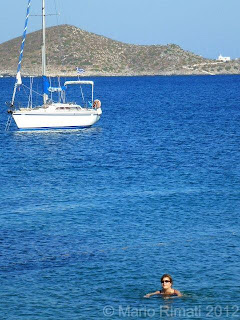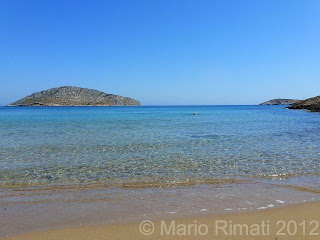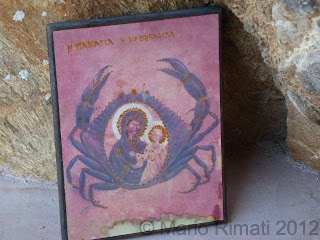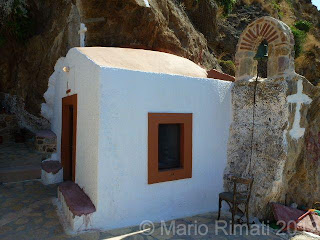We spent 8
wonderful days on the wonderful Greek island of Leros, in the Aegean Sea. We went during a great period and with few
tourists around, from Sept. 3rd to the 10th (great
weather with about 30 degrees and LOTS of sun, not a single cloud in the sky!). Leros is part of the Dodecanese Islands.
The trip itself
began from Rome’s Fiumicino airport directly to Athens’s airport, just a 90
minute flight (it’s always interesting to be in an airport which was in the
1980s a major hub for international hijackings, especially American TWA flights
to Beirut). We only spent a few hours
there but had a chance to see Athens from high above and to also capture some
of the locals as they too were waiting for their flights.
From there we took a
local flight to Leros, 45 minutes away by plane, and what a plane too! It was a 35-seater De Havilland propeller jet
(I believe it’s a Canadian company)! I
think it was the very first time I took a plane of that size since flying at
age 7 when came to Italy on vacation for the very first time in my life. The plane was half-full and once up in the
air I imagined those famous movies where “Jaws” (Canadian actor Richard Kiel), who
starred if I’m not mistaken in two 007 movies, would pop out of the cockpit and
battle Bond OUTSIDE of the plane! Either
that or I imagined that at a certain point the pilot, donning large goggles and
a parachute on his back, would all of a sudden say “au revoir” to us all and would
throw himself out of the plane. Not a
terribly comforting feeling being aboard these small planes, especially when
your seat is right next to the propeller (you keep thinking, “Oh, how I hope
that it DOESN’T stop”!).
Both flights thank God were very smooth and we landed safe and sound on
the island of Leros in a rather small municipal airport and with a runaway
which wasn’t all that long either. The taxi drive to the hotel-studio was only 8
kms away. Leros itself is only some 317 km (or 171
nautical miles) from Athens’s port of Piraeus.
The entire island is only 74 square kilometres (29 sq mi) and has a
coastline of 71 km (44 mi). The population is 8,207, although this
figure swells to over 15,000 during the summer peak.
And naturally, once at the hotel-studio (we also chose this option last
year in Samos where we get to cook our own meals. Going out every night for souvlaki after
awhile can become a wee bit tiring), the very first thing we did was to rent a
scooter, a 125 cc. Quite amazing: for 8
days (we also used it before leaving for Rome) it came out to a mere 84 euros,
with unlimited mileage too! That works
out to only 10.50 per day, I think rather unthinkable for a rental in Italy.
Leros has a rather imposing medieval castle of the Knights of Saint John
which had been possibly built on a Byzantine fortress plus 6 nice windmills
that lead up to the road for the castle. We went up there several times to see the sun
go down. The island also had a famous
sanctuary of the goddess Artemis.
Not only splendid sun and crystal-clear blue water on these magnificent islands but also a LOT of interesting history, as old Julius Caesar who had once been imprisoned on the island (he had been held hostage by local pirates for forty days), or the years spent there by Alexander the Great and also his successors. Several others occupied Leros, such as the Genoese and the Venetians too.
It was interesting to see that the Italians dominated the island for 31 years. In 1912, during the Libyan War against the Ottoman Empire, the Italians occupied all of the Dodecanese islands. The island was seized by the sailors of the Italian Navy cruiser "San Giorgio". The Greek inhabitants of the islands declared the autonomy of the islands under the title "The Aegean State", with the aim of unification with Greece, but with the outbreak of the First World War, these moves came to nothing, and the Italians retained control of the islands.
The new Italian Fascist regime actively attempted to Italianize the Dodecanese by making the Italian language compulsory, giving incentives to locals to adopt the Italian nationality, and clamping down on Greek institutions (that would also explain why 80 year-olds who live there still speak very fluent Italian). In the 1930s a new model town, Portolago, was built by the Italian authorities. It’s one of the best example of what is called “Italian rationalist architecture”. The Greeks later renamed the town/port Lakki.
There’s a part of Rome (known as EUR) and surrounding towns of the Eternal City which have typical architecture of that Fascist period. One such town, some 100 kms from Rome, is Sabaudia. Leros’s port Lakki has, as one can see from the pictures, buildings and areas which are very similar to the Sabaudia area.
During the 31 years that the Italians remained in Leros, they set up a great plan to build and fortify the island, since its strategic position and its large natural harbours (the largest of which, Lakki, is the largest deep water harbour in the Mediterranean Sea), made it an ideal naval base. The fortification of Leros and the creation of a major naval base at Lakki ensured that the Italians had control over an area of vital interest to the Allies. Mussolini saw the island as a crucial base for the Italian domination of the eastern Aegean Sea, and even built a mansion for himself in the town of Portolago.
From 1940, when Italy entered the Second World War on the side of Germany, Leros suffered bombing raids by the British Royal Air Force. As a result of the excellent anchorage provided to warships by the many natural coves, the island was the second most bombed during World War Two (after Crete). On 8 September 1943, as Italy could not continue the war on the German side, it signed an armistice and came over to the Allied camp. After the Italian armistice, British reinforcements arrived on Leros and other Dodecanese islands and the island suffered some major and continuous German aerial bombardment (for two solid days too). The forces involved were paratrooper units and a battalion from the elite Brandenburg division. The ground troops were supported by bombers of the Luftwaffe. The island remained under German occupation until the end of the war.
After the Germans evacuated the island, it came under British administration, until, on 7 March 1948, together with the other Dodecanese Islands, Leros was united with Greece. Approximately 700 years after the end of Byzantine rule, the Dodecanese was incorporated into the Greek State. During the post-war years the Greek governments used many buildings in Leros for various reasons. In 1959, the mental hospital of Leros was also founded, whose original bad conditions have been improved.
During the junta of the Greek Colonels of the 1960s the island was used as a place of internal exile for political dissenters, with old Italian barracks of the island used as a concentration camp (in what now are Greek army barracks, barracks which also contain small tanks as Greek-Turkish tensions are always alive and kicking in that part of the world).
Something on that Greek military junta of the 1960s by Prof. Noam Chomsky’s book, “The Essential Chomsky” (2008, p. 208):
“The dedicated savagery with which the U.S. Mission (in Athens) set about the task of liquidating the class enemy was a bit too much even for the British who are not known for their gentlemanly decorum in such procedures; they were also not too happy about being displaced from yet another output of British influence and power. With the enthusiastic approval and direct participation of the U.S. Mission, tens of thousands were exiled, tens of thousands more were sent to prison islands where many where tortured or executed (or if lucky, only “re-educated”) the unions were broken, and even mild anti-Communist socialists were suppressed, while the United States shamelessly maintained the electoral process to ensure the right men won. The social and economic consequences were grim. A decade later, “between 1959 and 1963, almost a third of the Greek labour force emigrated in search of satisfactory employment”. The fascist coup of 1967, again with apparent U.S. backing, had its role in the same events” (n.b. the Greek Junta lasted from 1967-1973).
After having visited several concentration camps in Germany, Austria (the dreaded Mauthausen camp), Poland (including Auschwitz-Birkenau) and also the Czech Republic (Terezin, north of Prague), one would NEVER imagine to be on a magnificent and peaceful island such as Leros and to be on a scooter passing by in front of a former concentration camp while on the way to a secluded beach, certainly NOT on a Greek island, that’s for sure! But alas, there on Leros is a sad example of yet another brutal dictatorship in days of old....
And speaking of another sad venue, there’s also the War Cemetery in Leros which is dedicated to 179 British soldiers and to also 2 Canadian and 2 South African servicemen who died during the war on the island. Looking at the rows of crosses one feels rather sorry for friends and relatives who have their loved ones buried on an island so far away.
Churches: plenty of them, very, very nice and also interesting, some quite small actually, such as the one dedicated to the Madonna and the crab (a rather long story behind that one).
Beaches: plenty of those too. We
personally visited a total of six of them.
Again, seeing that the island isn’t all that big you can move about
rather quickly, so we’d try to take in at least two a day. One in particular which wasn’t too far away
from the concentration camp was simply magnificent. When we got there at one point there were only
three of us. Eventually, the
quasi-deserted beach then “swelled” to 9 people!
“Mr. Bond”! And as always when
I’m in Greece, I CAN’T help thinking about Bond movies, not only with some of
the rather treacherous roads which remind me of 007 being chased by the bad
guys (such as some roads on that other great Greek island, Karpathos!) but also
some of the things on the island one sees, such as the blue French car which
was parked on that tiny beach. That car
was reminiscent of Bond’s “For Your Eyes Only” with Roger Moore as 007 and Bond
girl Carole Boquet where the two in that same car are being chased through the
tiny roads of Southern Europe. In fact,
as the car pulled up at the beach I was hoping to see 007 pop out and say, “My
name is Bond. James Bond”! Geese and goats also populate the
island. It’s all very “Greek” to all of
a sudden be riding your scooter, taking a curve and suddenly be faced with
shepherds rounding up their goats and sheep and blocking the small roads. As I said, Leros is indeed very Bondish in
nature (as are also other Greek islands)!
Hotel/Studio: we went to a place called “Hotel Tony’s Beach” (www.tonybeach.gr). The place is located in Vromolithos and is a
hop, skip and a jump from the small port of Pandeli. It’s also not too far from both Lakki and the
Ag. Marina port (with an exquisite bakery!).
Very nice the hotel/studio as it has a beautiful view of not only the
beach but also of the castle and windmills off in the distance. A very comfortable location where you can
cook and eat what you want (the island is also well-stocked with small grocery
stores). The management decided to also
include in the price breakfast, which was also fine as we got to eat on our
small balcony while staring at a deep blue sky and crystal-clear sea. Yes, indeed a rough life I must say!
Generosity: while we were there
BBC World reported that unemployment in Greece had hit a whopping 24%! Quite tragic if one thinks about it, and yet,
the generosity once again of the Greeks (as last year in Samos) goes beyond
belief. On only one occasion did we have
to pay for two sunbeds and an umbrella, and that was an “astronomical” fee of
just 5 euros. In all other occasions the
beds and umbrellas were free. On the 2nd
last day that we checked out a beach as I went to pay for my coffee frappe’
(it’s the only place in the world where I drink the stuff, along with Mythos
beer!) I added: “How much also for the two beds and umbrella”? The owner looked at me and said, “Oh no, it’s
free for our guests”! Truly unbelievable
as the same thing in Italy and with its (eternal) crisis would be totally
unthinkable.
And all the people we bumped into, from shop owners to airport staff,
were very gracious indeed. That type of
philosophy (didn’t the Greeks after all invent it?) could be clearly seen in
the t-shirt which I bought in Samos last year: “Greek crisis. No job? No money?
No problem”! I don’t know just how many
countries in the world could still keep a smile with such a horrendous
unemployment rate as the Greek one (funny also to hear one Greek who said:
“There are economic problems in the world? It’s Greece’s fault! There are other problems in the world? It’s
Greece’s fault! It’s seems like it’s
ALWAYS Greece’s fault”!).
A last example of this incredible generosity (by the way, two Ouzo
drinks in a bar in Pandeli after dinner were only 3 euros!) was the last
evening when we decided to go to a fish restaurant in Pandeli (we also caught
on a Saturday night their local feast with typical Greek dancing. It looked as so though the entire town was
there. Again, incredible generosity on
behalf of the Greeks as they offered what looked like unlimited doses of white
and red wine! And the entire scene seemed
like something out of “Zorba The Greek” with old, young and tourists alike
taking part in the traditional dances!).
The bill came out to 24 euros. I
gave the owner 50 euros. Instead of
giving me back 26 euros she gave me back 30, a 20 euro bill and two 5 euro
bills. I thought she made a mistake so I
went back to give her 5 euros. She not
only refused to take them but she ALSO wanted to give me back a 1 euro
change! Indeed a rarity when you’re on
vacation in a foreign country!
‘Twas indeed sad after 8 wonderful days when we had to head back to the
tiny airport (again, we prayed that the length of the runway we be enough for
our 35-seat plane, otherwise we would have had to go once again swimming!) and
our connecting flight back to Rome. But
as the saying (doesn’t go): “All roads lead to a Greek island”, and with over
200 of them which are inhabitable (out of some 6,000), for SURE we shall head
back to this wonderful and very accommodating country.
Greece, it’s simply soooooooo Greek!
































































































No comments:
Post a Comment